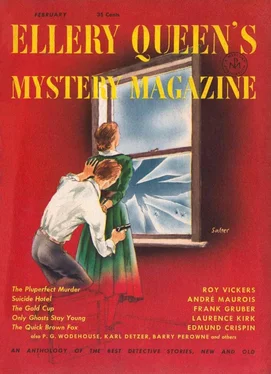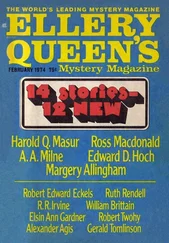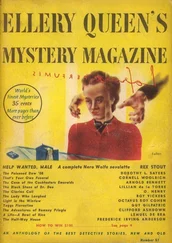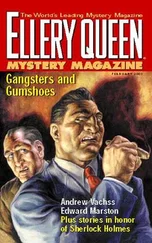E. Ashton - Ellery Queen’s Mystery Magazine. Vol. 19, No. 99, February 1952
Здесь есть возможность читать онлайн «E. Ashton - Ellery Queen’s Mystery Magazine. Vol. 19, No. 99, February 1952» весь текст электронной книги совершенно бесплатно (целиком полную версию без сокращений). В некоторых случаях можно слушать аудио, скачать через торрент в формате fb2 и присутствует краткое содержание. Город: New York, Год выпуска: 1952, Издательство: American Mercury, Жанр: Детектив, на английском языке. Описание произведения, (предисловие) а так же отзывы посетителей доступны на портале библиотеки ЛибКат.
- Название:Ellery Queen’s Mystery Magazine. Vol. 19, No. 99, February 1952
- Автор:
- Издательство:American Mercury
- Жанр:
- Год:1952
- Город:New York
- ISBN:нет данных
- Рейтинг книги:4 / 5. Голосов: 1
-
Избранное:Добавить в избранное
- Отзывы:
-
Ваша оценка:
- 80
- 1
- 2
- 3
- 4
- 5
Ellery Queen’s Mystery Magazine. Vol. 19, No. 99, February 1952: краткое содержание, описание и аннотация
Предлагаем к чтению аннотацию, описание, краткое содержание или предисловие (зависит от того, что написал сам автор книги «Ellery Queen’s Mystery Magazine. Vol. 19, No. 99, February 1952»). Если вы не нашли необходимую информацию о книге — напишите в комментариях, мы постараемся отыскать её.
Ellery Queen’s Mystery Magazine. Vol. 19, No. 99, February 1952 — читать онлайн бесплатно полную книгу (весь текст) целиком
Ниже представлен текст книги, разбитый по страницам. Система сохранения места последней прочитанной страницы, позволяет с удобством читать онлайн бесплатно книгу «Ellery Queen’s Mystery Magazine. Vol. 19, No. 99, February 1952», без необходимости каждый раз заново искать на чём Вы остановились. Поставьте закладку, и сможете в любой момент перейти на страницу, на которой закончили чтение.
Интервал:
Закладка:
“Raffles! What about Benjamin, T.?”
Raffles’ gesture dismissed an irrelevance. “Miles away by now,” he said. “He was warned earlier in the evening — not that he deserved it. But that was the second letter I wrote — for Richmond to push under the door of the Queen’s Grace and Favour house while we were at the Embassy.”
I drew in a deep breath. “Raffles,” I said, “I take off my hat to you.”
“Thank you, Bunny,” he said, but I saw his slight frown. “I can tell you one thing, though—”
“Yes?”
“I was devilish annoyed when Colonel Saxe offered us his disgusting bribe. He may/be an officer,” added A. J. Raffles, as lie pushed open the door of Florian’s, “but he doesn’t know a gentleman when he sees one.”
The Ten O’Clock Scholar
by Harry Kemelman
More of Harry Kemelman’s thoughts and theories on ’tec technique: At first sight, says Mr. Kemelman, it would appear that the classical detective story is a game of “Guess Who?” which the author plays with the reader. This view, in Mr. Kemelman’s opinion, is absolutely false. The reader’s psychological reaction to a game is entirely different from his psychological reaction to a story. In a mental game we derive our pleasure and satisfaction from solving the problem. But in a detective story, if we succeed in guessing the identity of the villain before the author tells us, we are apt to disparage the author s skill — in the same way that we disparage the skill of a stage magician if we see through his tricks...
The truth is (if we may venture our own opinion), most readers make no real attempt to solve the problem ahead of the author’s own revelation. And for most readers, this is as it should be: the primary purpose of detective fiction is entertainment; if, in addition to enjoyment and escape, you also wish to sharpen your wits in a duel with the author, so be it — but this honing of the mind is purely a plus value, an extra dividend, a bonus for your investment of time and money ...
I do not think it was a strong sense of justice that prompted Nicky Welt to come to my assistance on occasion, after I left the Law Faculty to become County Attorney. Nor as Snowden Professor of English Literature at the university would his interests be likely to lie in the functions of my office. Rather, I think, it was a certain impatience of mind — like that of the skilled mechanic who chafes as he watches the bungling amateur and at last takes the wrench from his hand with a “Here, let me do it.”
Nevertheless, I felt that he enjoyed these brief excursions from the narrow routine of lecturing and grading papers, and when he invited me to attend a doctoral examination, I felt that it was his way of thanking me and reciprocating.
I was busy at the time and loath to accept, but it is hard for me to refuse Nicky. He was only two or three years older than I, but his prematurely white hair (my own was only just beginning to gray at the temples) and his lined, gnome-like face made him appear many years my senior; and perhaps for that reason it seemed natural for him to treat me with a certain condescension, and equally natural for me to accord him the deference that complemented it.
But a three-hour doctor’s oral can be very dull if you are not yourself the candidate, or at least a member of the examining committee. So I temporized.
“Who is the candidate, Nicky?” I asked. “One of your young men? Anyone I know?”
“A Mr. Bennett — Claude Bennett,” he replied. “He has taken some courses with me, but he is not working in my field.”
“Anything interesting about his dissertation?” I continued.
Nicky shrugged his shoulders. “Since this is a preliminary examination according to the New Plan, we don’t know what the dissertation subject is. In the last half-hour of the examination the candidate will announce it and outline what he hopes to prove. I understand from other members of the committee, however, that Mr. Bennett’s interest is primarily in the Eighteenth Century, and that he is planning to do some work in The Byington Papers.”
And now I thought I saw light. I suppose no university is really complete without a faculty feud. Ours was localized to the English Department, and the principals were our two Eighteenth Century specialists, Professor George Korngold, biographer of Pope, and Professor Emmett Hawthorne, discoverer and editor of The Byington Papers. And so bitter was the conflict between the two men that Professor Hawthorne had been known to walk out of meetings of learned societies when Korngold rose to speak, and Korngold had once declared in a sectional meeting of the Modern Language Association that The Byington Papers were a Nineteenth Century forgery.
I smiled knowingly. “And Korngold is on the committee?” Professor Hawthorne, I knew, was at the University of Texas for the semester, as an exchange professor.
Nicky’s lips twisted into a most unscholarly smirk. “They’re both on the committee, Korngold and Hawthorne.”
I looked puzzled. “Is Hawthorne back?”
“We had a wire from him saying that he had made arrangements to return north early, ostensibly to check proof on the new edition of his book. But I consider it most significant that we got the wire shortly after Bennett’s examination date was posted in the Gazette , and equally significant that he is due to arrive the night before the examination. Of course, we invited him to participate and he wired his acceptance.” Nicky rubbed his hands with pleasure.
And although in the nature of things I did not expect to enjoy the proceedings quite as much as Nicky would, I thought it might be interesting.
Like many an anticipated pleasure, however, the actuality proved disappointing. The candidate, Claude Bennett, failed to appear.
The examination was scheduled for ten o’clock Saturday morning, and I arrived in good time — about a quarter of — so as not to miss any part of the fun. The committee had already assembled, however, and I could detect from the general atmosphere, and more particularly from the way the members were grouped as they stood around and gossiped, that Korngold and Hawthorne had already had an exchange or two.
Professor Korngold was a large, stout man, with a fringe of reddish hair. His naturally ruddy complexion was exaggerated by a skin disorder, a form of eczema from which he suffered periodically. He smoked a large curved-stem pipe which was rarely out of his mouth, and when he spoke, the burbling of the pipe was a constant overtone to the deep rumble of his voice.
He came over to me when I entered the room and offering his hand, he bellowed, “Nicky said you were coming. Glad you could make it.”
I took his outstretched hand with some reluctance for he was wearing a soiled cotton glove on the other to protect, or perhaps only to conceal, the broken skin where the eczema had penetrated. I withdrew my hand rather quickly, and to cover any awkwardness that might have resulted, I asked, “Has the candidate arrived yet?”
Korngold shook his head. He tugged at his watch chain and brought forth a turnip of a watch. He squinted at the dial and then frowned as he snapped the case shut. “Getting on to ten o’clock,” he rumbled. “Bennett better not funk it again.”
“Oh, he’s been up before, has he?”
“He was scheduled to come up at the beginning of the semester, and a day or two before, he asked for a postponement.”
“Does that count against him?”
“It’s not supposed to,” he said, and then he laughed.
I sauntered over to the other side of the room where Professor Hawthorne was standing. Hawthorne was a small, tidy man, with more than a touch of the dandy about him. He had pointed mustaches, and he was one of the few men in the university who wore a beard, a well-trimmed imperial. He also went in for pince-nez on a broad black ribbon, and even sported a cane, a slim ebony wand with a gold crook. All this since his discovery of The Byington Diary some few years ago, during a summer’s study in England. He had been an ordinary enough figure before that, but the discovery of The Byington Papers had been hailed by enthusiasts as of equal importance to the deciphering of the Pepys Diary, and honors had come to him: a full professorship, an editorial sinecure with a learned publication, and even an honorary degree from a not too impossible Western college. And with it had come the imperial and the cane and the pince-nez on a ribbon.
Читать дальшеИнтервал:
Закладка:
Похожие книги на «Ellery Queen’s Mystery Magazine. Vol. 19, No. 99, February 1952»
Представляем Вашему вниманию похожие книги на «Ellery Queen’s Mystery Magazine. Vol. 19, No. 99, February 1952» списком для выбора. Мы отобрали схожую по названию и смыслу литературу в надежде предоставить читателям больше вариантов отыскать новые, интересные, ещё непрочитанные произведения.
Обсуждение, отзывы о книге «Ellery Queen’s Mystery Magazine. Vol. 19, No. 99, February 1952» и просто собственные мнения читателей. Оставьте ваши комментарии, напишите, что Вы думаете о произведении, его смысле или главных героях. Укажите что конкретно понравилось, а что нет, и почему Вы так считаете.












